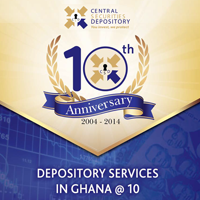 Ivory Coast has attracted almost $5bn of orders in its return to bond markets just three years after
default, in the latest sign of increased investor demand for frontier market debt.
Ivory Coast has attracted almost $5bn of orders in its return to bond markets just three years after
default, in the latest sign of increased investor demand for frontier market debt.
The 10-year, $750m bond, which is expected to price at a yield of 5.625 per cent, was more than six times subscribed – attracting an overall book of $4.75bn.
The yield on the bond is set to be lower than that of Kenya’s record-breaking $2bn bond in June.
African debt markets have grown rapidly in the past two years as governments and companies move to take advantage of low global interest rates and strong investor appetite for higher yields.
“Investors are increasingly keen to invest in frontier markets, but when it comes to Africa, they are also increasingly eager to address each country on its own individual merits rather than seeing the continent as an undifferentiated whole,” said Nicholas Samara, debt capital markets banker at Citi, one of the banks involved in the sale.
“In the case of the Ivory Coast, the country has been reaping peace dividends since its return to political stability.”
Ivory Coast suspended payments on a $2.3bn bond in 2011 following a period of intense political unrest. The bond, issued in 2010, was itself part of a restructuring of securities originally issued in 1998, which the country had defaulted on.
However, the country – the world’s leading cocoa producer – has since returned to a period of political stability under president Alassane Ouattara.
The International Monetary Fund forecasts that the Ivory Coast’s economy will grow 8.2 per cent in 2014 – the fourth-highest predicted growth in Africa.
“If you want to turn a country into an emerging market by 2020, you need to have a high rate of growth, and that needs huge investment,” said Daniel Kablan Duncan, prime minister and finance minister of the Ivory Coast.
He added that the proceeds of the bond would be mainly used to finance public investment, especially in fields such as healthcare and education.
Other “frontier markets” with a history of default have recently announced a return to the bond market. Ecuador, which defaulted five years ago, issued a $2bn bond last month.
“I think that you have seen people become more comfortable with frontiers,” said Stuart Culverhouse, head of research at frontier markets specialist Exotix. “These markets have benefited from people thinking more mainstream emerging markets are fragile.”
Citi, BNP Paribas and Deutsche Bank worked on the deal.
Meanwhile, Senegal is meeting with investors in the US and Europe this week to pitch a new $500m government bond, days after the Ivory Coast began a sales trail for its own $500m bond.
Dakar has asked Citigroup, Société Générale and Standard Chartered to set up meetings with fixed income investors for what is expected to be a new benchmark bond.
Bankers said low interest rates around the world have led to a honeymoon period for African governments seeking to raise debt on international markets.
Kenya’s debut on international capital markets last month attracted orders more than four times higher than the $2bn raised, putting Africa on track to exceed the record $11bn raised on global capital markets last year.
Bankers said investor interest in the new Ivory Coast bond appeared to be positive, as demand for the country’s existing debt had increased, pushing down yields.
Yields on Senegal’s outstanding 10-year dollar-denominated bond have also fallen, from 6.86 per cent at the start of the year to 5.99 per cent.
A further Islamic debt sale in also in the pipeline in Senegal, where Muslims make up more than 90 per cent of the population. The four-year, 100bn CFA franc ($208m) bond will be the largest government sukuk issued in sub-Saharan Africa.
Following an investor roadshow targeted at institutional investors the bond is expected to be priced at the end of this week.
The sukuk will not pay interest, which is forbidden under Islamic law, but will provide an annual profit of 6.25 per cent based on the returns from an underlying asset.
Africa remains a growth story, according to Nicholas Samara of debt capital markets at Citigroup, although he noted that investors differentiated between countries more assiduously than they once did.
“There have been multiple debt issues from Africa in the past few years and credit investors take a less general view of the region now,” he said. “One of the key themes of investor roadshows is the specific use of proceeds – investors want to know how money will be used.”
Senegal has said it plans to use its new debt sale to repay an existing loan as well as to finance public infrastructure projects. Ivory Coast has publicised its plans to expand roads, bridges and electricity infrastructure.
Credit rating agencies warn that sub-Saharan African growth has not translated into an improvement in credit quality.
“Africa rising has been a headline theme this year,” said Ravi Bhatia, director of sovereign ratings at S&P, one of the world’s largest credit rating agencies. “S&P has concerns about the fiscal and current account deficits in the region.”
Source: myjoyonline.com


